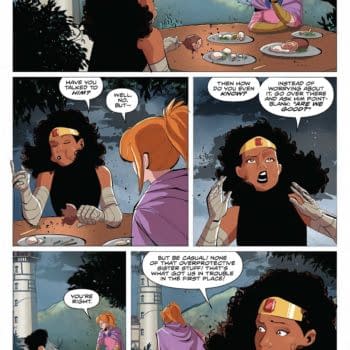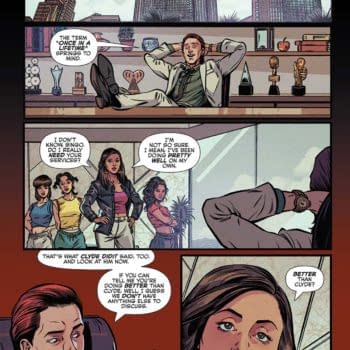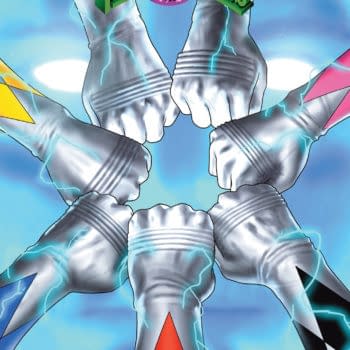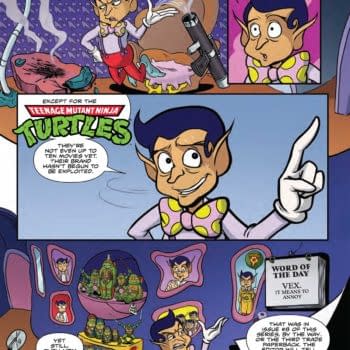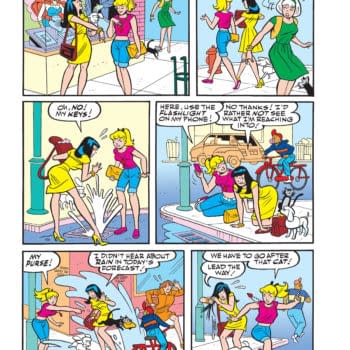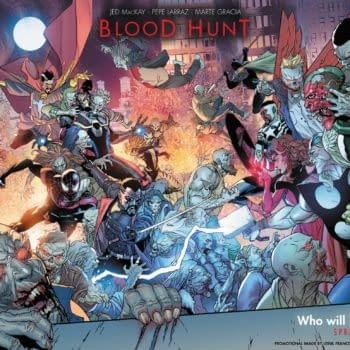Posted in: Comics, san diego comic con | Tagged: comic con, Comics, entertainment, female superheroes, film, san diego, san diego comic con, sdcc, tv, wonder woman
Wonder Women of the 21st Century At San Diego Comic Con – 'We Live In A World Of Superheroes Now'
By Hilton Collins
Four creators discussed the state of female characters in genre entertainment during the Friday afternoon panel, Wonder Women of the 21st Century at San Diego Comic-Con. Fans and critics have long argued that pop culture storylines often perpetuate negative female stereotypes and deny women characters the same three-dimensional story development that male counterparts receive.
Writer Genese Davis (The Holder's Dominion, MMORPG.com) moderated the panel, which comprised genre creators and enthusiasts like actress Susan Eisenberg (Justice League, Justice League: Unlimited), actor and filmmaker Adam Simon (Synapse, Man Down), and model and genre fan Adrianne Curry (America's Next Top Model).
They spoke at length about the uphill battle creators face in bringing fully realized female characters to life in an industry led by people whom, in most cases, don't seem to want that. But the panelists did believe that things are getting better, little by little.
Davis mentioned, for example, the Disney Junior animated series Doc McStuffins, featuring an African-American girl who has the power to fix toys with stuffed animals' help. McStuffins, who wants to be a doctor when she grows up, is challenging the stereotype in childrens' minds that most physicians are white males.
They also noted recent depictions of female characters that made them look more normal and less like strippers or fitness models. Simon, for example, said that artist Rob Prior (Heavy Metal) used a model with a "regular" body type for a Wonder Woman illustration, and Davis, an avid gamer, said that she loved that the new League of Legends character Jinx had a petite, unique look that's atypical of most female gaming characters.
"There are people in the industry that are moving in this direction — trying to be more open and honest," Simon said.
Davis called instances like these leaps in the right direction, but Eisenberg felt that they were more like baby steps.
"'Leaps' isn't the right word. I see movement," Eisenberg said. "Things take time, and as long as we're moving in the right direction, I'm confident it'll happen.
Eisenberg, who's probably most famous for voicing Wonder Woman in multiple DC Comics animated and video game projects, has also voiced other fictional women in video games. According to her, those characters are often rendered and illustrated with ridiculously curvy bodies in spite of how thoughtful and deep the writing or acting is that supports them.
"It's more how they're drawn than who they are," she said. Eisenberg mentioned that she could play a scientist with a great mind but a stereotypical body. "She's a nuclear physicist but she's a 36 DDD. That's who they are."
They'd been inspired by powerful fictional women. Simon loved that Wonder Woman was a tough, likeable woman just by being herself and not trying to be like male superheroes. Eisenberg said playing Wonder Woman changed her life when she'd encounter and hear from fans thrilled that this character they loved was being brought to life in a successful animated series. Curry said she liked watching the Aeon Flux cartoon on MTV when she was girl, about a sexy female assassin who answered to no one but herself.
But Curry, who was dressed in Poison Ivy cosplay that day, said she also loved the famous Batman villain. She referenced an old Batman: the Animated Series episode where Ivy teamed up with Harley Quinn and tried to motivate her to leave the Joker, her sociopathic boyfriend who didn't love her.
"Ivy is trying to empower Harley and tell her, 'You're with a sociopathic jerk that doesn't love you,' and Ivy was so powerful to me," Curry said. "I really liked Ivy's position in that, her trying to reason with a little ball of madness appealed to me."
Some of the panelists hope to reverse gendered assumptions in their work. Davis, who's an avid gamer for example, wanted to change many people's perception — including other women — that only men care about online and tabletop gaming. People in the publishing industry wanted her to change her protagonist, a young female gamer, into a male. They also wanted her to go by her initials, "G.D." as an author instead of by her full name to hide the fact that she was a woman writing about a male-dominated past-time. She fought against both, and her book has been published the way she wanted it be.
Simon faced a different kind of struggle when he started developing his movie Synapse. The film, which drops in November, features an ensemble cast and a plot about memory thieves and government agents. When Simon started pitching it to studios, they wanted him to change one of his main characters from female to male to make it more marketable. He produced his film independently because he didn't want to play along.
"We went out and filmed the movie independently and financed it ourselves and did it how we wanted to," he said. "I think that's kind of standard in certain circles, that there's a misogynistic view, but I think it's changing at a fast pace."
He told the audience that there's no proof that films with female leads and prominent female characters are box office poison, so he has no idea why there's such a gender bias in Hollywood.
But gender bias and stereotypes also put women under insane body image pressure. Curry, the only model on the panel, thought it was sad—and weird—that in modeling, they make- and dress-up 14-year-old girls to look like mature women when they could easily just get mature women, like Curry herself, to do the work instead. This creates a situation where adult women feel like they have to look like young girls, many of whom haven't even developed complete, mature female bodies yet.
Curry's 32 now, "old" in the modeling world, so she works out to build muscle and stand-out from other models who just focus on staying really slim. It backfires on her, at times, when people tell her that the muscle on her is too masculine.
Men also face body image issues thanks to unrealistic media portrayals. Simon, an actor, has been told in auditions that he'd be better for parts if he lost weight, which is why he's done a lot of his own projects.
"I'd say I can't get a break because I have this Bruce Willis Die Hard 1 body type. That's not the world we live in. We live in a world of superheroes now," he said.
Davis agreed that women aren't the only ones bombarded by physical exaggerations. Davis recalled that a man asked her at a gaming panel why all male characters have to have chiseled jaws. Simon chimed in to say that being an artist or fan takes strength because you're going against the mold if you don't look a certain way.
But ultimately, it's up to fans to decide whether they'll support genre art that's more open and accepting, or keep maintaining the status quo. Eisenberg said as much in reference to comic book portrayals, but her words were applicable to all media.
"It's the people who buy the comics. They have a voice on Twitter [and] Facebook. They have money in the pickets, and buying power determines that," she said. "The audience has to stand up for what they want and studios have to be brave."












